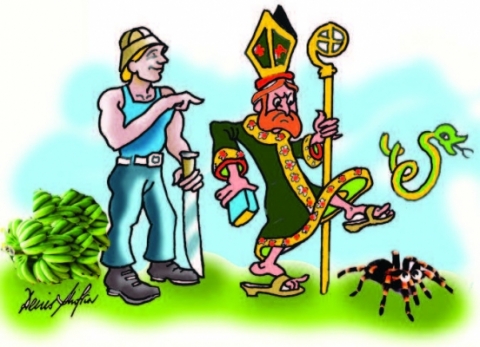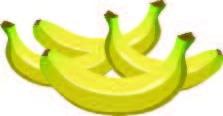Going Bananas
Illustration: Denis Shifrin
Recalling the time a bunch of us helped with the kibbutz harvest
It was during a short visit to friends on Kibbutz Beit HaEmek—mid-winter 1966, but glorious weather. Idealistically I took my heavy boots, because I knew that I would be expected to join in the farm-work, as indeed did most of the visitors and volunteers.
Early the next morning, a large number of us gathered at the labor office for the allocation of casual jobs. The sadran avodah (work-organizer) seemed not to notice me at first. He gave out all the best jobs to the other young volunteers whom he knew from previous days. Some of them had been there for a week or more, not a one-day wonder like me. They were the tallest, toughest ones—looking as if they were recently from out of a sports team that was taking a break. A small group of ten, including myself, was yet uncalled. But our fate was already signed and sealed, "right, you lot," he exclaimed, "bananas!"
It was that time of year when the kibbutz's best-quality bananas were being harvested for delivery and immediate sale. On this kibbutz they were known as "Mike's bananas", although he is now only of blessed memory. This was because of the tender loving care he gave them during the rest of the year. It was claimed that some years before they had produced an amazing three-point-two tons per dunam, and this was a record.
It was a longish ride out to the banana plantations on the back of the tractor-towed trailer on which we were perched. On the way one of the volunteers gave me a kind of leather pad, fitted with straps. "You'll need to strap this on", he explained. So I did so, just like the others, on my right shoulder not realizing exactly why, but I soon discovered that it was our job to be the shleppers of the big bunches of these almost-ripe fruit.
We arrived at the area of the plantation that was selected for our kindly attention. These well-cared for banana plants really live it up, with their drooping and fattening bunches being covered in tall blue plastic sacks, to protect them from the sun. The ground was littered with these blue bags and water pipes snaked all over the place, being connected to the occasional water sprinklers, stationed high above the huge flat green banana leaves. Our carefully cultivated plants were almost like royalty—the grove being surrounded by long guardian lines of soldiering poles, which support fences of green plastic, acting as wind-breaks.
Each plant has one or two dangling stems that branch off its main body, on which the bananas form as a series of "hands". These hands had grown inside the plastic-wrappers into tall bunches. Below each sack on a long drooping stalk, grew what appeared to be a large deep-red exotic flower, the petals of which dripped nectar. Several months before, there were lines of tiny banana flowers, located between the rows of these big protective petals. Each row subsequently formed a hand of the fruit. Progressively, the red petals shrivel as the whole bunch develops downwards, the row of actual banana flowers, one on the end of each finger, having formed, been pollinated and faded, giving way to the actual fruit.
"We will start with this row", says our leader, Henry. He was completely relaxed, tanned, bare-chested and was carrying a long slightly curved dangerous-looking machete. With his kova tembel, he appeared to be a mixture of that heroic Israeli boy character used by newspaper cartoonist Dosh for illustrating Haaretz and an armed Sindbad, but in boots not sandals. As we stepped into the grove, the heat and humidity hit us. Within these groves a sub-climate prevails, due to the frequent watering that the bananas need. The air was hot and stifling, with the odor of decaying vegetation--the ground having many soft patches, occasional weeds, rough clumps of soil and not a few stones.
I had been warned that banana groves contain many snakes, but I did not see one when I was there. I suppose it was because this grove was tended by Mike, who just before his aliyah from Ireland, had had a quick word with Saint Patrick, who is reputed to have banished all the snakes there. Nor did I see any tarantula spiders—not finding any victims they must already have danced themselves to death.
I watched as the first of the volunteers stood under a light-greenish banana bunch that had just been stripped of its red flower and sack. Stepping backwards, he took some of the weight of the bunch on his shoulder-pad and held the top of the stalk with his raised right-hand. With a couple of well-aimed blows, Henry severed its stalk, thankfully above this volunteer's hand. The latter shortened under the load, which was between 20 and 25 kilograms, but he had only a small distance to carry it to the willing hands of the loaders, who were standing on the trailer. In pairs, they lifted the naked bunch from him and in memory of the Noah Biblical tale (but without turning their backs), lovingly wrapped it in sack-cloth before placing it neatly on the padded floor of the trailer. All of the fresh-cut bunches were carefully piled-up in this way.
A line of the porters, myself included, followed behind Henry and his machete, as in single file we went deeper into the steaming jungle, like native bearers exploring equatorial Africa. In turn, each of us was loaded with a light-greenish bunch of this exotic fruit and then managed to find his way back through the soggy ground to the tractor and trailer. The volunteers looked as if they had been doing it all their lives, without difficulty. By the time my turn came we had penetrated well into the banana grove. A few of the returning volunteers had rejoined the queue of porters but the rows of banana plants had become somewhat ragged. I realized that the sound of the tractor's idling motor was the best means for finding one's way back. I came forward. "Step further under the bunch," advised Henry, and then he cut through the stalk. The suddenly-applied load was a real shock to my modest frame. "Off you go" he said, as if he were sending a child off to school.
Actually that first journey back wasn't too hard, I negotiated the rough terrain and with thick mud sticking to my boots arrived at the trailer breathing heavily, but quite pleased with myself for the achievement. "Be careful not to burst the fruit," ordered the loader, as I was thankfully relieved of my burden, for I had tried to rest it on the side of the trailer. As this activity went on, I became more and more exhausted. So I began to sing to myself that famous West Indian calypso:
"Come mister tally-man and tally me banana, Daylight come and I wanna go home. Day oh, day oh, daylight come and I wanna go home."
It helped, although home was far, far away.
On one of the rows, a huge bunch of the pampered fruit was impatiently waiting to meet up with me. It was as if this voluptuous bunch had complained that it was tired of hanging around and really wanted to see some action. "In the nude too, darling," chimed in a second bunch, "first they de-flower you and strip you bare, then carry you off and stack you away for later enjoyment!" Henry's faithful snickersnee* grimly replied "don't worry, I'll soon be getting through to you!"
I managed not to collapse under its weight, and blithely turned and headed for the faint sound of the tractor. There were some big weeds growing in the way, so I changed to a different row for my difficult journey back. I crossed over, looking for a new passage between the rows, took a few steps and suddenly was lost. No tractor-motor sounds. Horrors. Where the hell was that stupid tractor? I staggered on a short way with the hope that it would come back within ear-shot, but foolishly tripped on a rock or clod of soil, lost my balance and of course that bunch of highly sensitive and prized bananas fell to the soft ground along with myself. Disaster!
I was very tired and unhurt but I doubt if anyone noticed--fortunately for me they were all too busy and had moved on. Not a word was said, not even a grumble from my fallen beauty. I rested for a good while and don't know how I eventually managed to lift back that big bunch and continue to wander around the grove for an hour. Without any more accidents, I managed to return that precious load to the handlers on the second trailer, now tractor-less--although by that stage I simply didn't care much about what condition that blessed bunch was in. This trailer also was soon full of bunches. When it was all over, there being no room on the trailer, we had to walk back two kilometers to the residential center of the kibbutz--tired out, in the hot midday sun.
The next day the organizer recognized me. I probably was still a bit tired-looking, because he sent me for the easier job of an electrician's mate. We were installing cables along wooden roof-beams, for new lighting in the chicken-shed. That friendly electrician probably had sufficient experience of volunteers like me at this time of the year, so as I handed him a tool or some item of electrical equipment, he had the sense not to ask why I was using only my left-hand.
*A snickersnee is a large knife









Comments